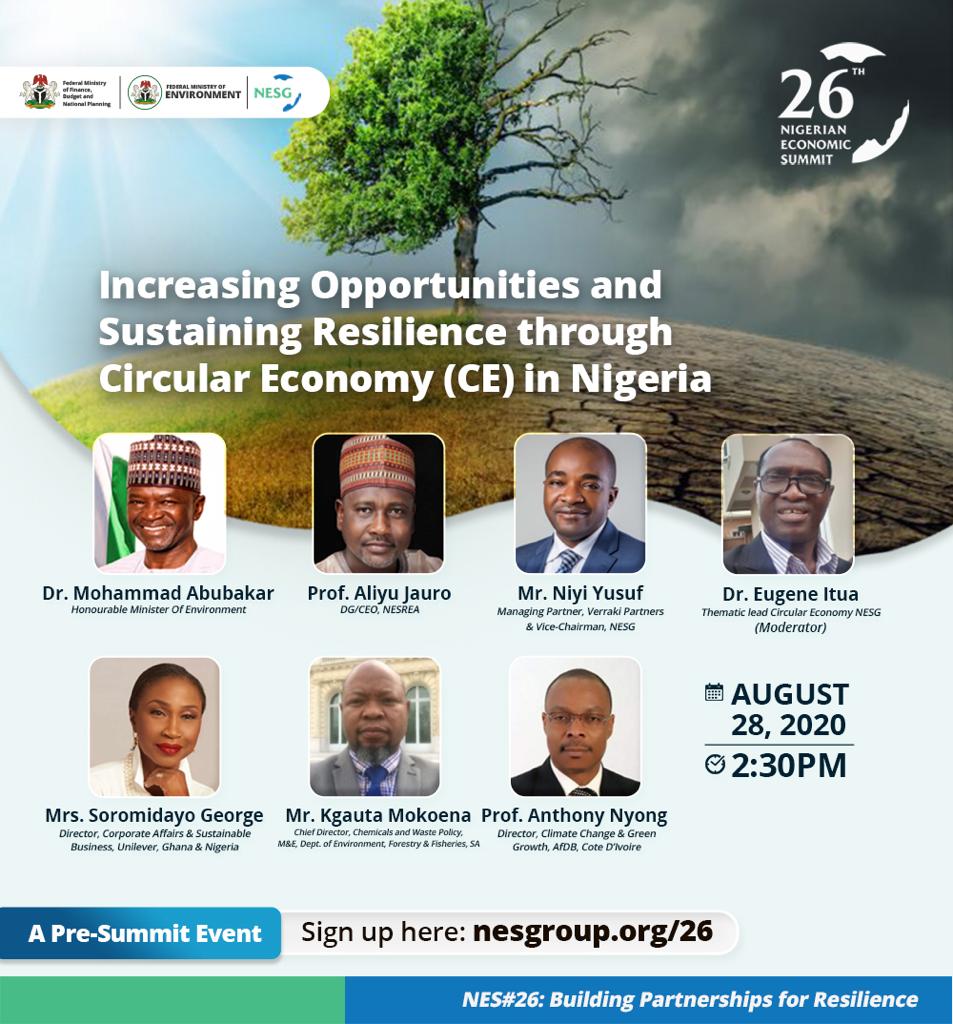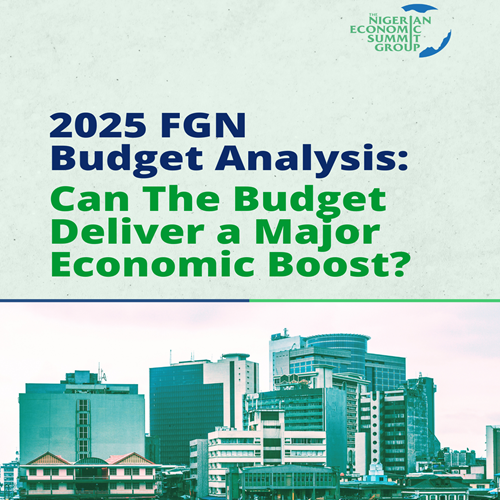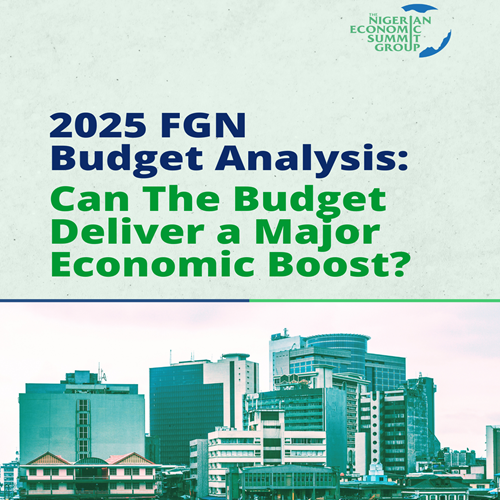Posted Sun, Aug 30, 2020 9:09 AM
NES26 Pre-summit Event: Increasing opportunities and sustaining resilience through Circular Economy in Nigeria

The Nigerian Economic Summit Group (NESG) and the Federal Ministry of Finance, Budget and National Planning in conjunction with the Federal Ministry of Environment held a Pre-#NES26 event with the theme “Increasing opportunities and sustaining resilience through Circular Economy in Nigeria” on the 28th of August 2020. The event which is among a series of pre- 26th Nigerian Economic Summit events will help to shape strategic partnerships to chart a path to recovery, and build resilience for the country’s economy, businesses and households by delivering conversations that will put Nigeria in a strong position within the changing world order.
The Vice-Chairman of the NESG, Mr. Niyi Yusuf while welcoming participants to the event said that the 26th Nigerian Economic Summit is a Big conversation for Action that seeks to build partnerships for Resilience. He said that there is a need for Nigeria to seize the opportunity presented by the COVID-19 pandemic to foster economic development. Furthermore, he stated that the adoption of the Circular Economy model will lead to higher resource efficiency, waste reduction and that the event seeks to create a pathway for its implementation.
While delivering the keynote address on ‘Delivering better outcomes in a post COVID Pandemic through circular Economy’, the Minister for Environment, Dr. Mohammed Mahmood Abubakar who was represented by the Deputy Director, Department of Climate change, Mrs. Halima Bawa-Bwari said the Circular Economy model came to the fore in the 1990s with the aim of reducing the dependence of economies on Natural resources. She said that the COVID-19 pandemic resulted in restriction of transportation which has increased waste and labour shortages that has had an adverse effect on the environment and the economy. She revealed that the Federal Ministry of Environment developed a post COVID-19 medium-term strategic recovery plan to help ameliorate problems arising from the pandemic and that the plans include ensuring compliance with relevant legal and statutory requirements, promoting sustainable development, managing the ecosystem, sustaining strong institutions etc. More so, she mentioned that future efforts will promote waste reduction, protection of public health and improving waste management on the long-term.
The Director-general of National Environmental Standards and Regulations Enforcement Agency (NESREA), Professor Aliyu Jauro while delivering a presentation on ‘Moving towards a Circular Economy model in Nigeria – Current Practices’ said that the Extended Producer Responsibility (EPR) will help to resolve Nigeria’s perennial waste management problems by decreasing environmental impact of products through the use of life cycle management. He revealed that the waste management EPR value chain presents a number of investment opportunities including waste collection and transport, equipment fabrication, product redesign/research etc.
The director Climate Change and Green Growth- African Development Bank, Professor Anthony Nyong said that Circular Economy takes note of local realities which sets it apart from other economic models and that the key drivers of Circular Economy are socio-economic and emerging trends, policies and a shift to resilient and low carbon development pathways.
During the Question and Answer session, Mrs. Soromidayo George, Director corporate Affairs and Sustainable Business Unilever said that Circular Economy is broad and the value chain includes design, produce, distribution, consumer use, reuse/repair and recycling which all have the potential to create jobs and generate revenue.
Mr. Kgauta Mokoena; Chief Director, Chemicals and Waste Policy, Monitoring and Evaluation, Department of environment, Forestry and Fisheries, South Africa while delivering his comments said that it is important to identify specific opportunities, accelerate adoption of Circular Economy and incentivize contribution to climate change for the model to be successful.
The 26th Nigerian Economic Summit will be the highpoint of a ‘Big Conversation for Action’ driven by pre-Summit events. These virtual events will kickstart discussions on this year’s Summit Theme and will enable us convene a wider range of stakeholders to deliberate on a broad set of thematic and sectoral issues with key outcomes.
The theme of this year’s Summit is “Building Partnerships for Resilience” and it is scheduled to hold from October 26 – 27, 2020. Discussions at NES #26 will be anchored on three pillars – Collaboration, Execution and Impact – and dimensioned across five sub-themes: Mapping the Future; New Trends, New Opportunities, New Horizons; Embracing Technology and Innovation; Building Resilience and Charting the Path to Recovery.
Find a blog post
Latest Releases

2025 FGN Budget Analysis: Can Th .. Read
2 days ago

2025 FGN Budget Analysis: Can Th .. Read
2 days ago
_1745876187.png)
Industrial Policy Commission Gen .. Read
2 weeks from now
